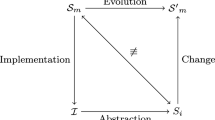Abstract
For any proposed software project, when the software requirements specification has been established, requirements changes may result in not only a modification of the requirements specification but also a series of modifications of all existing artifacts during the development. Then it is necessary to provide effective and flexible requirements changes management. In this paper, we present an approach to managing requirements changes based on Booth's negotiation-style framework for belief revision. Informally, we consider the current requirements specification as a belief set about the system-to-be. The request of requirements change is viewed as new information about the same system-to-be. Then the process of executing the requirements change is a process of revising beliefs about the system-to-be. We design a family of belief negotiation models appropriate for different processes of requirements revision, including the setting of the request of requirements change being fully accepted, the setting of the current requirements specification being fully preserved, and that of the current specification and the request of requirements change reaching a compromise. In particular, the prioritization of requirements plays an important role in reaching an agreement in each belief negotiation model designed in this paper.
Similar content being viewed by others
References
Wiegers K E. Software Requirements, 2nd Ed. Portland: Microsoft Press, USA, 2003.
Garcez A S, Russo A, Nuseibeh B, Kramer J. An analysis-revision cycle to evolve requirements specifications. In Proc. the 16th IEEE Conference on Automated Software Engineering (ASE2001), Coronado, USA, Nov. 26–29, 2001, pp.354-358.
Garcez A S, Russo A, Nuseibeh B, Kramer J. Combining abductive reasoning and inductive learning to evolve requirements specifications. IEE Proceedings of Software, 2003, 150(1): 25–38.
Kakas A C, Kowalski R, Toni F. The Role of Abduction in Logic Programming. Handbook of Logic in Artificial Intelligence and Logic Programming, Gabbay Dov M, Hogger C J, Robinson J A (eds.), Volume 5., 1998, pp.235-324.
Mitchell T M. Machine Learning. New York: McGraw-Hill, 1997.
Zowghi D, Offen R. A logical framework for modeling and reasoning about the evolution of requirements. In Proc. the 3 rd IEEE International Symposium on Requirements Engineering (RE1997), Jan. 5–8, 1997, Annapolis, USA, 1997, pp.247-257.
Zowghi D. A requirements engineering process model based on defaults and revisions. In Proc. the 11th International Workshop on Database and Expert Systems Applications (DEXA2000), Greenwich, UK, Sept. 6–8, 2000, pp.966-970.
Alchourrón C, GÄardenfors P, Makinson D. On the logic of theory change: Partial meeting contraction and revision functions. Journal of Symbolic Logic, 1985, 50(2): 510–530.
Darwiche A, Pearl J. On the logic of iterated belief revision. Artificial Intelligence, 1997, 89(1/2): 1–29.
Delgrande J, Dubois D, Lang J. Iterated revision as priorited merging. In Proc. the 10th International Conference on Principles of Knowledge Representation and Reasoning, Lake District, UK, Jun. 2–5, 2006, pp.210-220.
Fermé E, Hansson S. Selective revision. Studia Logica, 1999, 63(3): 331–342.
Booth R. A negotiation-style framework for non-prioritised revision. In Proc. the 8th Conference on Theoretical Aspects of Rationality and Knowledge (TARK2001), Siena, Italy, Jul. 8–10, 2001, pp.137-150.
Hansson S. A survey of non-prioritized belief revision. Erkenntnis, 1999, 50(2/3): 413–427.
Hunter A, Nuseibeh B. Managing inconsistent specification: Reasoning, analysis, and action. ACM Transactions on Software Engineering and Methodology, 1998, 7(4): 335–367.
Wiegers K. First things first: Prioritizing requirements. Software Development, 1999, 7(9): 48–53.
Davis A. Just Enough Requirements Management: Where Software Development Meets Marking. New York: Dorset House Publishing, 2005.
Karlsson J, Ryan K. A cost-value approach for prioritizing requirements. IEEE Software, 1997, 14 (5): 67–74.
Pardee W J. To Satisfy and Delight Your Customer: How to Manage for Customer Value. New York: Dorset House Publishing, 1996.
Zowghi D, Gervasi V. On the interplay between consistency, completeness, and correctness in requirements evolution. Information and Software Technology, 2003, 45(14): 993–1009.
Gervasi V, Zowghi D. Reasoning about inconsistencies in natural language requirements. ACM Transaction on Software Engineering and Methodologies, 2005, 14(3): 277–330.
Benferhat S, Cayrol C, Dobois D, Lang J, Prade H. Inconsistency management and prioritized syntax-based entailment. In Proc. the 13th International Joint Conference on Artificial Intelligence, Chambèry, France, Aug. 28-Sept. 3, 1993, pp.640-647.
Lehmann D. Another perspective on default reasoning. Annals of Mathematics and Artificial Intelligence, 1995, 15(1): 61–82.
Jin Y, Thielscher M. Iterated belief revision, revised. Artificial Intelligence, 2007, 171(1): 1–18.
Mu K, Jin Z. Identifying acceptable common proposals for handling inconsistent software requirements. In Proc. 27th IFIP WG 6.1 International Conference on Formal Techniques for Networked and Distributed Systems (FORTE2007), Tallinn, Estonia, Jun. 27–29, 2007, pp.296-308.
Author information
Authors and Affiliations
Corresponding author
Additional information
This work was partly supported by the National Natural Science Foundation of China under Grant No. 60703061, the National Basic Research 973 Program of China under Grant No. 2009CB320701, the Key Project of National Natural Science Foundation of China under Grant No. 90818026, and the NSFC & the British Royal Society China-UK Joint Project.
Electronic Supplementary Material
Below is the link to the electronic supplementary material.
Rights and permissions
About this article
Cite this article
Mu, KD., Liu, W., Jin, Z. et al. Managing Software Requirements Changes Based on Negotiation-Style Revision. J. Comput. Sci. Technol. 26, 890–907 (2011). https://doi.org/10.1007/s11390-011-0187-y
Received:
Revised:
Published:
Issue Date:
DOI: https://doi.org/10.1007/s11390-011-0187-y




